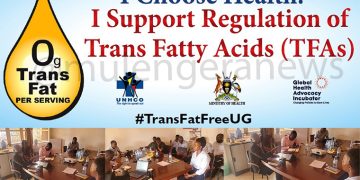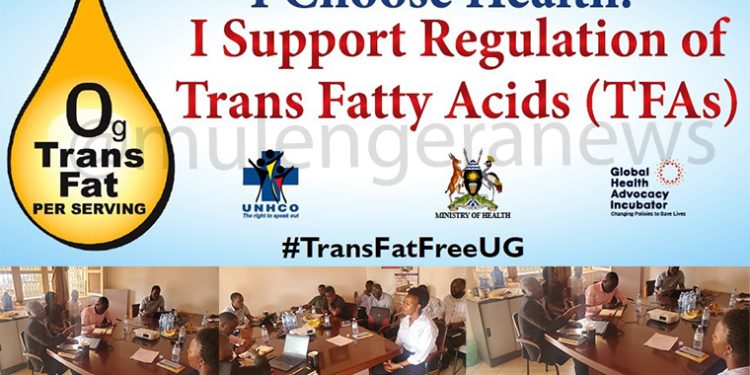By Mulengera Reporters
Ugandans are unknowingly consuming dangerous toxins that could be slowly leading them to life-threatening conditions such as heart disease, stroke, and diabetes.
This was the urgent warning sounded by the Uganda National Health Consumers Organisation (UNHCO) during a press briefing held at their offices in Bukoto, Kampala, on Wednesday, January 12, 2025.
The organization expressed concern over the rising consumption of trans fatty acids (TFA) in Uganda, attributing this trend to the increasing availability of ultra-processed foods and drinks. They called upon the government to impose strict regulations to curb the circulation of these harmful substances before the situation spirals out of control.
Mr. Aziz Agaba, a health policy analyst at UNHCO, provided a detailed insight into the dangers posed by trans fats. He explained that TFAs, particularly those that are artificially produced, are commonly found in processed foods such as baked goods, fried fast foods, and snacks like chips and biscuits. These fats are industrially altered to extend the shelf life of food products, making them more profitable for manufacturers.
However, what many Ugandans don’t realize is that trans fats have no nutritional value and are extremely harmful to human health. He cited global research showing that trans fats are directly linked to cardiovascular diseases, which account for nearly half of all deaths caused by non-communicable diseases. Agaba noted that Uganda is already battling a surge in lifestyle diseases due to unhealthy diets, and allowing the continued circulation of trans fats will only worsen the crisis.
UNHCO’s Legal Officer, Counsel Talibita Moses, issued a scathing criticism of Uganda’s weak regulatory framework regarding trans fats. He stressed that Ugandans are consuming these harmful substances without adequate awareness or protection from regulatory authorities. Talibita declared that trans fats are completely useless to the human body and that the body does not need them at all, noting that the only entities benefiting from their production are food industries that prioritize profits over public health.
Talibita also accused manufacturers of aggressively marketing processed foods and drinks to unsuspecting consumers, including children, without disclosing their health risks. He warned that Uganda’s health sector is already overburdened with infectious diseases like Ebola, which is proving to be a thorn in the government’s side, and that adding preventable health complications caused by TFAs would only further strain an already struggling system.
He called for urgent action from the government, suggesting the introduction of strict laws to regulate and eventually eliminate TFAs from the Ugandan market. Talibita also proposed imposing heavy taxes on products containing trans fats to discourage their consumption and make healthier alternatives more accessible. He pointed out that neighboring countries like Kenya and Tanzania have already enforced strict market regulations against TFAs and urged Uganda to follow suit.
As if that wasn’t enough, the legal officer went ahead and criticized the Uganda Communications Commission for allowing advertisements of unhealthy food products on media platforms, calling on the regulatory body to take responsibility for public health safety.
In line with its mission to promote a rights-based approach in Uganda’s health sector, UNHCO announced that it has signed an MoU with the Uganda National Bureau of Standards (UNBS). The agreement aims to strengthen market surveillance and ensure that food products containing industrially produced TFAs are phased out. Talibita further noted that the organization has already enlisted the expertise of lawyers, nutritionists, food scientists, and other experts to ensure that the fight against trans fats is backed by strong legal and scientific arguments. He stressed that this is not just a health issue but a national policy issue that requires urgent attention.
As an organization that envisions “a Uganda where the healthcare system guarantees full enjoyment of the right to health by all people,” UNHCO urged all Ugandans to become more conscious of what they eat. The organization called on citizens to read food labels carefully, choose healthier alternatives, and demand stronger government action against harmful food products.
UNHCO believes that eliminating trans fats is a shared responsibility and that Ugandans cannot wait for the government alone to act. As citizens, they must educate themselves and make better food choices. Healthier eating is a form of self-defense, and it starts with individual choices. (For comments on this story, get back to us on 0705579994 [WhatsApp line], 0779411734 & 041 4674611 or email us at mulengeranews@gmail.com).

































